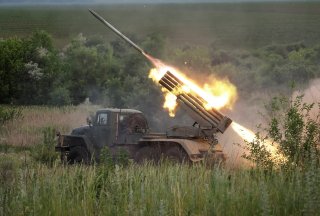In Reversal, Ukraine Takes Responsibility for Crimea Attacks
The commander-in-chief of Ukraine’s armed forces indicated that the purpose of the strikes had been to foil the Kremlin’s strategy to “distance” the war from Russian citizens.
General Valerii Zaluzhny, the commander-in-chief of Ukraine’s armed forces, announced on Wednesday that the Ukrainian military had been responsible for a series of mysterious explosions on the Russian-occupied Crimean peninsula over the summer. This was the first official confirmation of Kyiv’s involvement in what the government had previously dismissed as local accidents or sabotage efforts.
In an article co-authored with Ukrainian member of parliament Mikhailo Zabrodsky and published on Ukraine’s state-run Ukrinform news agency, Zaluzhny indicated that the attacks in Crimea—including a series of explosions at Russia’s Saki air base, thought to have destroyed at least ten Russian fighter planes—had been carried out by Ukrainian “rocket strikes,” although he did not provide further details.
The article indicated that the purpose of the strikes had been to foil the Kremlin’s strategy to “distance” the war from Russian citizens, including those who had traveled to Crimea for Russia’s traditional summer vacation season. Zaluzhny and Zabrodsky lauded the campaign as a “successful effort [by] the Armed Forces of Ukraine to physically transfer hostilities to Crimea,” targeting “the enemy’s Crimean air bases.”
Prior to Zaluzhny’s and Zabrodsky’s article, the Ukrainian military had avoided directly taking responsibility for the strikes. One Ukrainian official reportedly told Reuters in the aftermath of the attacks that they had been carried out by Ukrainian saboteurs within Crimea, while the Ukrainian defense ministry’s official Twitter account offered tongue-in-cheek speculation that the explosions had been caused by Russian soldiers smoking near explosive munitions. Russia’s defense ministry claimed in a statement after the explosion that it had been caused by negligence among air base personnel, without elaborating.
The Crimean peninsula—which Russia invaded and annexed from Ukraine in 2014 in violation of an agreement signed between the two countries in 1994—has largely remained peaceful since 2014, but became a hub for Russia’s troop buildup prior to the invasion and has since played host to a number of Russian air and naval bases. Russia’s Black Sea Fleet is headquartered in the Crimean port city of Sevastopol, the largest city on the peninsula, and prior to the explosion, the Saki airbase had been used to attack Ukrainian targets in the country’s southern regions.
In addition to the Saki explosion, a second series of explosions targeted a Russian ammunition depot near the village of Mayskoye in mid-August. Ukraine did not claim responsibility for that incident, which Russia’s defense ministry blamed on unspecified “saboteurs.”
Trevor Filseth is a current and foreign affairs writer for the National Interest.
Image: Reuters.

